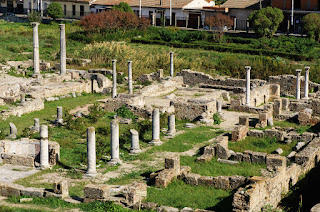Failing and Flourishing (III): The City of God
 |
| Hippo Regius (Dan Sloan, Flickr) |
In the fourth century, the Emperor Constantine was converted to Christianity, and the Church rejoiced. However we view this now, remember that after centuries of persecution, this wasn’t such a bad idea. But as we know, there were strings, institutional and theological. One of the theological consequences was the temptation to an early form of prosperity theology. Constantine’s accession was hailed as divine provision, not just for the Church but for Rome which would surely be blessed - Romam iterum magnam fac! Make Rome Great Again. It was the end of history.
Just a few decades later, in the year 410, Rome was sacked by the Goths. The bright Constantinian day had experienced a devastating form of climate change. Divine favor seemed to have been withdrawn from Rome, despite its newly Christian character; and of course there were those devotees of the old order who saw the catastrophe precisely as induced by the abandonment of tradition.
A predictable Christian response was to claim that the calamity of Rome’s sack was only a flesh wound, relative to the inexorable spread of the Gospel and the general progress of peace and justice. If the Church and the world were not yet as one, this was only a matter of time, and the indications were that everything was fine.
Augustine of Hippo, who saw these events unfold, famously took a very different view. While affirming divine sovereignty, Augustine saw the present age—the saeculum of our term ‘secular’—as opaque to theological interpretation. While events are meaningful, their meaning can and will only be disclosed eschatologically. In the meantime we know we must act faithfully.
This was a sort of theological agnosticism about the character of history, or at least about the interpretation of specific events. Augustine thus formulated his famous view of the relationship between the Church and society, or rather between the city of God and the earthly city. These two communities co-exist, and together constitute society and its history, but are not distinguishable in the present.
Augustine would remind us that history itself must not be interpreted through the narrow focus of present experience, but from the perspective of eternity - which is not accessible to us by experience, but of which we are given a vision in scripture, and for which we are fed by the sacraments.
So success and failure at a given point may not be what they appear. This is the message of Augustine's City of God, but is also reflected in the very fact that he and other early African Christians are still worth thinking about. Augustine's own episcopal see of Hippo was being besieged by Vandals at the time of his death, and the whole North African Church which spawned the examples and the thoughts of people like Perpetua and Augustine ultimately disintegrated in the aftermath of the Arab conquests.
We do not however interpret their significance to us by pious and proud appeals to the numerical strength of Christianity in Tunisia and Algeria, but rather through reflection on the examples of their courage, the abiding significance of their ideas, and the inspiration of their faith. While deeply culturally and historically specific, their witness continues to inform and interrogate our own constructions of success and failure. They remind us that God's presence and purpose are not really the stuff of programs and statistics, even though these matter. In the last analysis, we are called to be faithful; some of us may also be blessed with success.
[This and two other posts are from a talk given to the Board of Directors of the Consortium of Endowed Episcopal Parishes and invited guests at the Church of the Heavenly Rest, New York City, September 5 2018]


Comments
Post a Comment